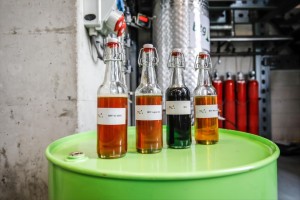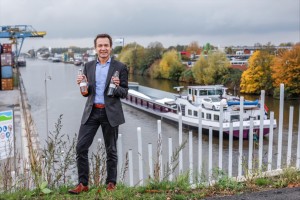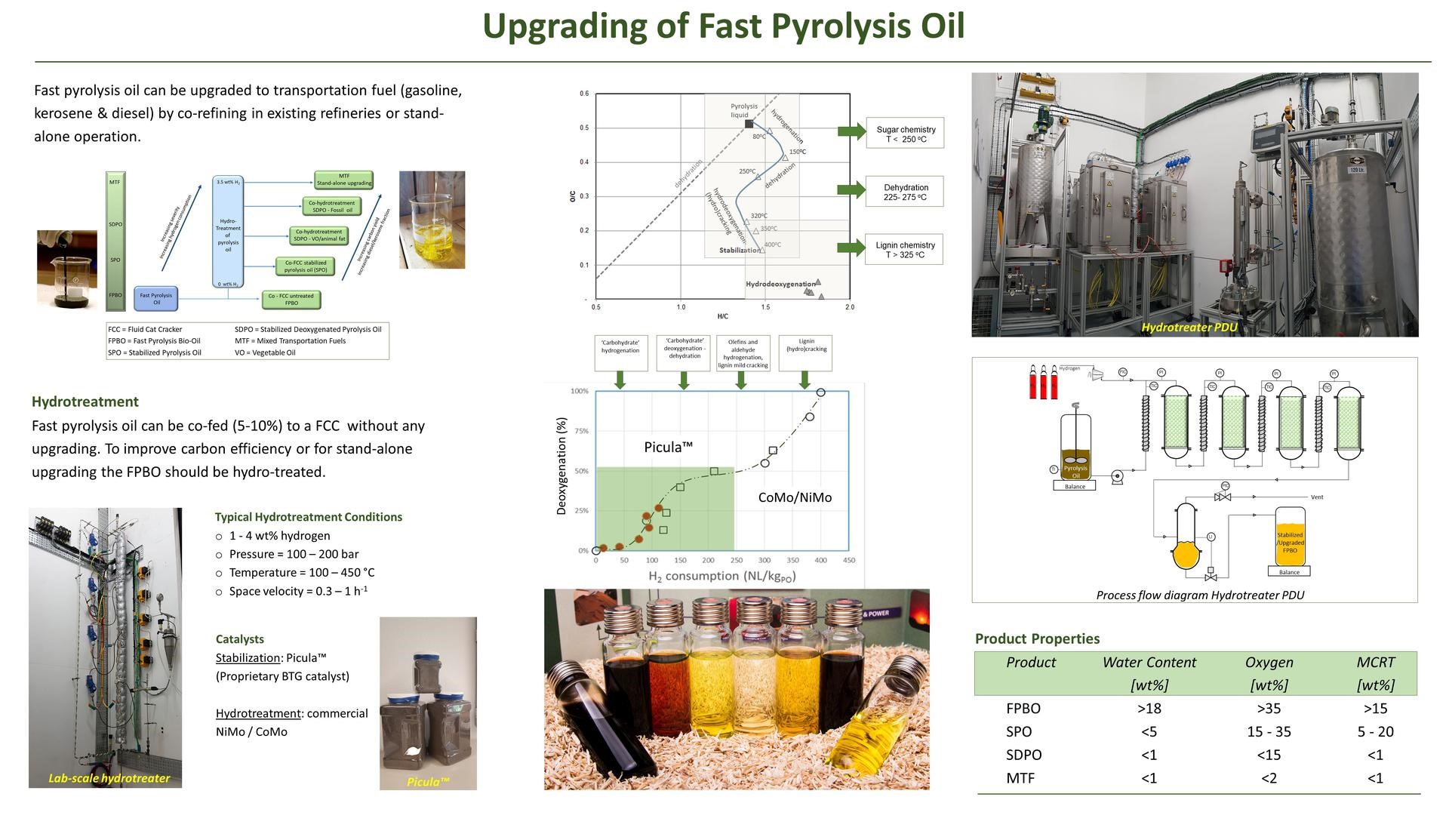BTG and GoodFuels exploring options for joint investment
 Enschede, 14 November 2019 – Ships will soon be able to power their engines using 100% sustainable biofuel. This year, the Dutch company BTG will set up a new high-tech technology company for converting crude pyrolysis oil into diesel fuel suitable for the shipping sector. It will be the first refinery in the world for an advanced marine biofuel based on pyrolysis oil.
Enschede, 14 November 2019 – Ships will soon be able to power their engines using 100% sustainable biofuel. This year, the Dutch company BTG will set up a new high-tech technology company for converting crude pyrolysis oil into diesel fuel suitable for the shipping sector. It will be the first refinery in the world for an advanced marine biofuel based on pyrolysis oil.
The new facility will be operated by a new company named BTG-neXt. In the first phase, BTG-neXt will focus on building a pilot refinery for converting pyrolysis oil into 100% sustainable biodiesel for ships in order to demonstrate that continuous production is feasible. Pyrolysis oil is made from biomass-based residues such as sawdust and roadside grass cuttings and is a sustainable alternative for replacing fossil fuels.
Scaling up
The new demonstration facility will have a planned production capacity of a modest 1000 tons of advanced marine fuel per year. René Venendaal, CEO of BTG: ‘That capacity is sufficient to demonstrate that the technology works and will serve as a basis for further scaling up our operations’. According to Venendaal, the pilot will require a six-figure investment: ‘We are now working on a more precise estimate of that figure’. The goal is to use the pre-commercial facility as a reference for rolling out commercial refineries with a capacity of possibly hundreds of thousands of tons per year of an advanced marine biofuel for ships.
BTG previously adopted a similar strategy for the production of pyrolysis oil in 2008, when it established a new company called BTG-BTL. Under the responsibility of BTG-BTL, the Empyro production facility in Hengelo, the Netherlands, was built, which demonstrated that it was not only technically feasible to produce oil from sawdust but that it was also a commercially viable proposition. In 2019, Empyro was acquired by the waste processing company Twence. In 2019, BTG-BTL received its first orders for almost identical copies of the Empyro plant for delivery to companies in Sweden and Finland, where sawmill waste such as sawdust will be used for producing pyrolysis oil.
Partnership with GoodFuels
The plans drafted by BTG for the next decade have been welcomed with enthusiasm by the market. GoodFuels,a pioneer and market leader in sustainable biofuels for shipping, sees sufficient potential in BTG’s plans to explore the possibility of a collective investment in the demonstration plant.
 CEO of GoodFuels, Dirk Kronemeijer: ‘Over the last five years, GoodFuels has prepared the road for the use of biofuels in the shipping sector. Together with partners such as Boskalis Loodswezen, Port of Rotterdam, Norden, Jan de Nul and its portfolio of GoodShipping A-Brand clients we have shown that these fuels will play an essential role in making shipping more sustainable. The next step is to scale up the processes without making any concessions in terms of the sustainability of the feedstocks used. BTG’s project meets all the crucial success criteria, and we are very proud to work together with BTG to introduce this highly significant innovative technology in the Netherlands’.
CEO of GoodFuels, Dirk Kronemeijer: ‘Over the last five years, GoodFuels has prepared the road for the use of biofuels in the shipping sector. Together with partners such as Boskalis Loodswezen, Port of Rotterdam, Norden, Jan de Nul and its portfolio of GoodShipping A-Brand clients we have shown that these fuels will play an essential role in making shipping more sustainable. The next step is to scale up the processes without making any concessions in terms of the sustainability of the feedstocks used. BTG’s project meets all the crucial success criteria, and we are very proud to work together with BTG to introduce this highly significant innovative technology in the Netherlands’.
The intended location for the new pilot plant is ‘as close to home as possible’, explains Venendaal. ‘As was the case with BTG-BTL and Empyro, we need to have short lines of communication and be able to provide the services needed as efficiently as possible’. GoodFuels intends to market the pilot volumes produced in order to be able to also optimise the commercial business case.
Venendaal: ‘At present, most ships, in particular seagoing vessels, use low-quality fuel oil that is almost tar-like in nature. The potential for growth in terms of sustainability is therefore extremely high for this sector’. The low-sulphur diesel fuel for the shipping sector made from pyrolysis oil also complies with the stringent standards that will be introduced in 2020 for sulphur emissions in the shipping industry.
Port of Rotterdam
The ports of Rotterdam and Eemshaven are the locations being considered for the first commercial processing plant. Dirk Kronemeijer, CEO of GoodFuels: ‘Rotterdam would be our preferred location as most of our shipping clients are active here. In addition, Rotterdam offers a great many opportunities for further integration due to the existing infrastructure already in place there’.
 BTG has been working on developing the new technology since 2000. Venendaal: ‘We have been developing various building blocks over the past 15 years, which are part of several parallel projects still underway. In the near future, we will be integrating these building blocks, in order to realise the new plant’. Venendaal has good hope that the first commercial plants will also be profitable on a limited scale: ‘We are looking at investments in the order of €200 million per processing plant, but we are already seeing that many potential clients, due to market demand, would prefer building even larger facilities’.
BTG has been working on developing the new technology since 2000. Venendaal: ‘We have been developing various building blocks over the past 15 years, which are part of several parallel projects still underway. In the near future, we will be integrating these building blocks, in order to realise the new plant’. Venendaal has good hope that the first commercial plants will also be profitable on a limited scale: ‘We are looking at investments in the order of €200 million per processing plant, but we are already seeing that many potential clients, due to market demand, would prefer building even larger facilities’.
The technology for producing oil via pyrolysis from plant-based residual waste streams such as wood residues and roadside grass was developed 30 years ago at the University of Twente.It is actually a similar process by which fossil oil is produced in the earth. The main difference is that it takes millions of years for it to happen in the earth’s crust, whereas the pyrolysis technology accomplishes this in only a few seconds. BTG was established in 1987 as an independent privately-owned company specialising in the conversion of biomass into energy. BTG has built up an excellent reputation on the creation of spin-offs introducing new technologies successfully into the market. In 1993, BTG acquired the rights from the University of Twente to further develop and scale up the new pyrolysis technology.
About BTG
Biomass Technology Group (BTG) is an independent privately-owned company whose roots go back to the Faculty of Chemical Technology at the University of Twente. BTG contributes to the sustainable energy transition by developing new technologies that make it possible to replace fossil fuels by using biomass to produce advanced biofuels. The goal is to increase the global share of bioenergy, advanced biofuels, and green raw materials by developing and realising a variety of projects and initiatives all over the world.
BTG-BioLiquids (BTG-BTL), a sister company of BTG, is working with TechnipFMC to roll out the innovative pyrolysis technology for the production of bio-oil from wood waste.
About GoodFuels
GoodFuels is a Dutch based sustainable fuel pioneer and energy transition partner for the shipping sector and heavy land-based transport. All of GoodFuels’ biofuels can be used to replace fossil fuels in these sectors without any motor or engine modifications (drop-in). They reduce the CO2 footprint by up to 90% (Well-to-Wheel) and comply with the most stringent sustainability standards. GoodFuels has an independent sustainability board, composed of leading NGOs and academics, which provides advice on the sustainability of individual fuels. In addition to its role as a biofuels pioneer, GoodFuels is engaged in launching innovative and sustainable products, services and business models (such as the succesfull Goodshipping program addressing cargo owners) as well as exploring new markets and convincing decision-makers to adopt more sustainable policy approaches. It aims to improve transparency and reliability and create robust ecosystems around its clients with a single overriding mission: speeding up the energy transition and creating a better world for all of us.

Text by the Dutch company BTG


